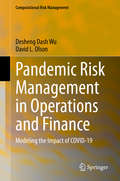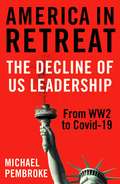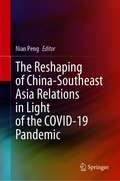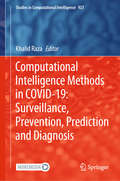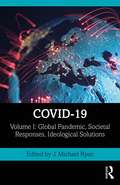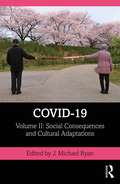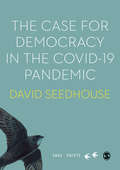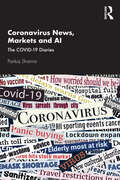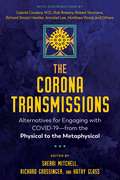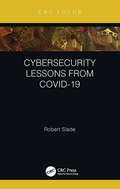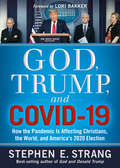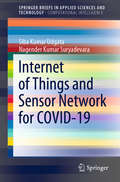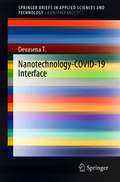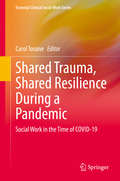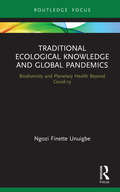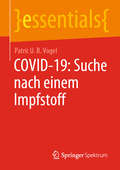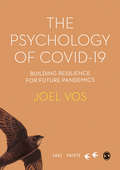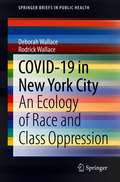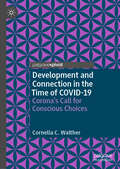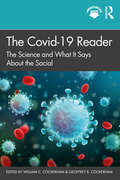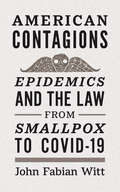Special Collections
Everything you ever wanted to know about the COVID-19 pandemic
- Table View
- List View
Pandemic Risk Management in Operations and Finance
by David L. Olson and Desheng Dash WuCOVID-19 has spread around the world, causing tremendous structural change, and severely affecting global supply chains and financial operations. As such there is a need for analytic tools help deal with the impact of the pandemic on the world’s economies; these tools are not panaceas and certainly won’t cure the problems faced, but they offer a means to aid governments, firms, and individuals in coping with specific problems. This book provides an overview of the COVID-19 pandemic and evaluates its effect on financial and supply chain operations. It then discusses epidemic modeling, presenting sources of quantitative and text data, and describing how models are used to illustrate the pandemic impact on supply chains, macroeconomic performance on financial operations. It highlights the specific experiences of the banking system, which offers predictions of the impact on the Swedish banking sector. Further, it examines models related to pandemic planning, such as evaluation of financial contagion, debt risk analysis, and health system efficiency performance, and addresses specific models of pandemic parameters. The book demonstrates various tools using available data on the ongoing COVID-19 pandemic. While it includes some citations, it focuses on describing the methods and explaining how they work, rather than on theory. The data sets and software presented were all selected on the basis of their widespread availability to any reader with computer links.
America in Retreat
by Michael PembrokeIn the heady days after 1945, the authority of the United States was unrivalled and, with the founding of the UN, a new era of international co-operation seemed to have begun. But seventy-five years later, its influence has already diminished. The world has now entered a post-American era, argues Michael Pembroke, defined by a flourishing Asia and the ascendancy of China, as much as by the decline of the United States. This book is a short history of that decline; how high standards and treasured principles were ignored; how idealism was replaced by hubris and moral compromise; and how adherence to the rule of law became selective. It is also a look into the future – a future dominated by greater Asia and China in particular. We are in the midst of the third great power shift in modern history – from Europe to America to Asia. Covering wars in Korea, Vietnam, Iraq and Afghanistan, interventions in Iran, Guatemala and Chile, and a retreat from international engagement with the UN, WHO and, increasingly, trade agreements, Pembroke sketches the history of America&’s retreat from universal principles to provide a clear-eyed analysis of the dangers of American exceptionalism.
The Reshaping of China-Southeast Asia Relations in Light of the COVID-19 Pandemic
by Nian PengThis book aims to examine the multiple effects of the COVID-19 pandemic on China-Southeast Asia relations from both Chinese and Southeast Asian perspectives. It invites many officials and scholars from the leading think-tanks and famous universities in China and Southeast Asian states to contribute and tries to reveal how has China-Southeast Asia relations been reshaping during/after the COVID-19 pandemic and discuss what kind of measures could be taken to push forward China-Southeast Asia relations and thus ensuring the peace and prosperity in the region. The main content of this book is divided into 10 parts, in which the first chapter briefly introduces the COVID-19 situation in China and Southeast Asia, China’s anti-COVID efforts, and the impacts of the COVID-19 on China-Southeast Asia relations from Chinese and Southeast Asian perspectives. Chapter 2 examines the dual influence of the pandemic on the construction of China-ASEAN community of a shared future and gave some useful policy recommendations on improving China-Southeast Asia relations. The following 8 chapters go deep into the Southeast Asian states’ response to COVID-19 and the economic, political and social effects of the COVID-19 on Southeast Asia–China relations, and look forward the future development of such relations. In addition, it also analyzes Southeast states’ reactions to the intense Sino-US power rivalry during/after the COVID-19 pandemic.This book is probably the first comprehensive study that investigates the impacts of the COVID-19 pandemic on China–Southeast Asia relations from both Chinese and Southeast Asian perspectives. It would not only open up a new area of study on China and Southeast Asia relations, but provide insightful observations and useful information for governments, companies and social organizations to facilitate cooperation in trade and investment, public health, and people-to-people exchanges. Therefore, the intended readership not only includes the academics but also officials, businessmen, journalists and social activists.The most important feature of this book is that it points out China–Southeast Asia relations would be reshaped by COVID-19 in the long run and analyzes how it would be reshaped. It also shows a well-balanced view on the COVID-19 and China–Southeast Asia relations as both university scholars, think-tank experts and government officials are involved in this book.
Computational Intelligence Methods in COVID-19: Surveillance, Prevention, Prediction and Diagnosis
by Khalid RazaThe novel coronavirus disease 2019 (COVID-19) pandemic has posed a major threat to human life and health. This book is beneficial for interdisciplinary students, researchers, and professionals to understand COVID-19 and how computational intelligence can be used for the purpose of surveillance, control, prevention, prediction, diagnosis, and potential treatment of the disease. The book contains different aspects of COVID-19 that includes fundamental knowledge, epidemic forecast models, surveillance and tracking systems, IoT- and IoMT-based integrated systems for COVID-19, social network analysis systems for COVID-19, radiological images (CT, X-ray) based diagnosis system, and computational intelligence and in silico drug design and drug repurposing methods against COVID-19 patients. The contributing authors of this volume are experts in their fields and they are from various reputed universities and institutions across the world. This volume is a valuable and comprehensive resource for computer and data scientists, epidemiologists, radiologists, doctors, clinicians, pharmaceutical professionals, along with graduate and research students of interdisciplinary and multidisciplinary sciences.
COVID-19
by J. Michael RyanThe SARS-CoV-2 virus, and the associated COVID-19 pandemic, is perhaps the greatest threat to life, and lifestyles, the world has known in more than a century. The scholarship included here provides critical insights into the ethics and ideologies, inequalities, and changed social understandings that lie at the heart of this pandemic. This volume maps out the ways in which the pandemic has impacted (most often disproportionately) societies, the successes and failures of means used to combat the virus, and the considerations and future possibilities – both positive and negative – that lie ahead. While the pandemic has brought humanity together in some noteworthy ways, it has also laid bare many of the systemic inequalities that lie at the foundation of our global society. This volume is a significant step toward better understanding these impacts. The work presented here represents a remarkable diversity and quality of impassioned scholarship and is a timely and critical advance in knowledge related to the pandemic. This volume and its companion, COVID-19: Volume II: Social Consequences and Cultural Adaptations, are the result of the collaboration of more than 50 of the leading social scientists from across five continents. The breadth and depth of the scholarship is matched only by the intellectual and global scope of the contributors themselves. The insights presented here have much to offer not just to an understanding of the ongoing world of COVID-19, but also to helping us (re-) build, and better shape, the world beyond.
COVID-19
by J. Michael RyanThe SARS-CoV-2 virus, and the associated COVID-19 pandemic, is perhaps the greatest threat to life, and lifestyles, the world has known in more than a century. The scholarship included here provides critical insights into the institutional responses, communal consequences, cultural adaptations, and social politics that lie at the heart of this pandemic. This volume maps out the ways in which the pandemic has impacted (most often disproportionately) societies, the successes and failures of means used to combat the virus, and the considerations and future possibilities – both positive and negative – that lie ahead. While the pandemic has brought humanity together in some noteworthy ways, it has also laid bare many of the systemic inequalities that lie at the foundation of our global society. This volume is a significant step toward better understanding these impacts. The work presented here represents a remarkable diversity and quality of impassioned scholarship and is a timely and critical advance in knowledge related to the pandemic. This volume and its companion, COVID-19: Volume I: Global Pandemic, Societal Responses, Ideological Solutions, are the result of the collaboration of more than 50 of the leading social scientists from across five continents. The breadth and depth of the scholarship is matched only by the intellectual and global scope of the contributors themselves. The insights presented here have much to offer not just to an understanding of the ongoing world of COVID-19, but also to helping us (re-) build, and better shape, the world beyond.
The Case for Democracy in the COVID-19 Pandemic
by David SeedhouseOne moment life was normal, the next, governments around the world were imposing radical lockdowns of their populations. But why were decision-makers so readily ignoring centuries of hard-won civil freedoms? Where was the discussion of ethics and human rights? Why were we so easily controlled and why were our controllers so willing to do it? In The Case for Democracy, David Seedhouse explores the psychological biases; distorted risk perceptions; frenetic journalism; the disputed science; the narrow focus of ′experts′; value judgements dressed up as truths; propaganda; the invisibility of ethics; and the alarming irrelevance of inclusive democracy that have been features of governmental responses to the covid-19 pandemic. Seedhouse argues that the chaotic governmental response to Coronavirus, with no attempt to include the public, is the perfect argument for an extensive, participatory democracy; a democracy that demonstrates practical decision making by listening to everyone’s knowledge and expertise. Now is the time for us to solve our problems together.
The Case for Democracy in the COVID-19 Pandemic
by David SeedhouseOne moment life was normal, the next, governments around the world were imposing radical lockdowns of their populations. But why were decision-makers so readily ignoring centuries of hard-won civil freedoms? Where was the discussion of ethics and human rights? Why were we so easily controlled and why were our controllers so willing to do it? In The Case for Democracy, David Seedhouse explores the psychological biases; distorted risk perceptions; frenetic journalism; the disputed science; the narrow focus of ′experts′; value judgements dressed up as truths; propaganda; the invisibility of ethics; and the alarming irrelevance of inclusive democracy that have been features of governmental responses to the covid-19 pandemic. Seedhouse argues that the chaotic governmental response to Coronavirus, with no attempt to include the public, is the perfect argument for an extensive, participatory democracy; a democracy that demonstrates practical decision making by listening to everyone’s knowledge and expertise. Now is the time for us to solve our problems together.
Coronavirus News, Markets and AI
by Pankaj SharmaCoronavirus News, Markets and AI explores the analysis of unstructured data from coronavirus related news and the underlying sentiment during its real-time impact on the world and on global financial markets, in particular. In an age where information, both real and fake, travels in the blink of an eye and significantly alters market sentiment daily, this book is a blow by blow account of economic impact of the COVID-19 pandemic. The volume: Details how AI driven machines capture, analyse and score relevant on-ground news sentiment to analyse the dynamics of market sentiment, how markets react to good or bad news across ‘short term’ and ‘long term’; Investigates what have been the most prevalent news sentiment during the pandemic, and its linkages to crude oil prices, high profile cases, impact of local news, and even the impact of Trump’s policies; Discusses the impact on what people think and discuss, how the COVID-19 crisis differs from the Global Financial Crisis of 2008, the unprecedented disruptions in supply chains and our daily lives; Showcases how easy accessibility to big data methods, cloud computing, and computational methods and the universal applicability of these tool to any topic can help analyse extract the related news sentiment in allied fields. Accessible, nuanced and insightful, this book will be invaluable for business professionals, bankers, media professionals, traders, investors, and investment consultants. It will also be of great interest to scholars and researchers of economics, commerce, science and technology studies, computer science, media and culture studies, public policy and digital humanities.
The Corona Transmissions
by Sherri Mitchell, Richard Grossinger and Kathy Glass• Includes contributions from 35 well-known authors, doctors, herbalists, First Nations teachers, economists, astrologers, and others, such as Richard Strozzi-Heckler, Annabel Lee, Matthew Wood, Gabriel Cousens, M.D., Rob Brezsny, and Robert Simmons • All royalties for this book go to the Land Peace foundation, serving First Nations tribes in Maine The pandemic of Coronavirus Disease 2019 (COVID-19) is the biggest event of our lifetimes. This global experience has affected human history, ecology, epidemiology, and supply chains with the suddenness of 9/11, yet with a far greater extent, duration, and toll--the end of which is not yet in sight. Exploring a broad spectrum of new perspectives on COVID-19, from the physical to the metaphysical, from ecological to political, from apocalyptic to proto-utopian, and from scientific facts and health tips to imaginings, visionings, poems, and awakenings, this anthology offers an antidote to the barrage of data and speculation from the mainstream. The 35 contributors, including Laura Aversano, Charles Eisenstein, Zoe Brezsny, Meryl Nass, M.D., Bobby Byrd, and Joel and Michelle Levey, address the virus as a fellow being, allowing it to speak to us and through us. They attempt to describe, understand, interpret, and decipher the virus at biological, serological, epidemiological, social, political, astrological, and ontological levels. The virus is explored in terms of cultural critique, divination, prophecy, warning, elucidation, and opportunity. Medical doctors, herbalists, naturopaths, indigenous healers, and homeopathic physicians tell us about coronavirus history, treatments, and prevention protocols; yoga teachers about cultivating inner balance and harmony; and economists, poets, psychotherapists, and First Nations teachers about the vast effects of the virus and the way forward. They explore how the disease speaks directly and how it meticulously addresses our relationship to Gaia, to its animal, plant, and mineral kingdoms, to each other, and to the economies and dystopia we have created. As a visionary whole, The Corona Transmissions asks you to respond, to engage your wisdom and creative imagination, to resist easy categorization and resolutions, and to participate in a collective dance and chant for healing, peace, equality, and a habitable future. Viruses do not live except by virtue of us carrying them. We are the living ones and our bodies, minds, hearts, and spirits will prevail.
Merck: Covid-19 Vaccines
by Willy ShihCovid-19 infections were still climbing across the U.S. and many other parts of the world in September 2020, and it seemed that every time Ken Frazier, the CEO of Merck & Co. consented to an interview in recent months he always seemed to hear the same question, "Where's Merck?" The company, a leader in the global vaccine business had a low public profile even though it was working assiduously on two vaccine candidates for the SARS-CoV-2 virus that causes Covid-19. The U.S. Government had initiated a high profile program - Operation Warp Speed (OWS) - to accelerate the development of vaccines, but Merck was notably absent. Should Merck seek or accept funding from OWS, and what terms might accompany such an agreement?
Mortgage Backed Securities and the Covid-19 Pandemic
by Luis M. Viceira and Emil Nuwan Siriwardane and Dean XuIn April 2020, global financial markets were still reeling as the Covid-19 pandemic spread rapidly across the world. Global equity markets had initially fallen by 30% in response to the pandemic, and high-yield credit markets had dropped by nearly 20%. In contrast, U.S. Treasury markets were up 20% year-to-date (YTD). Interestingly, the U.S. Mortgage Backed Security (MBS) market had been much less responsive to the health crisis, exhibiting very low volatility throughout this period and returning about 2% YTD. Maya Russell, head of asset allocation research at a large global institutional investor, must make a recommendation on whether her fund's board should invest in MBS, and if so, whether this is a good time for the fund to implement the allocation and whether it should do so pursuing an active or a passive investment approach. This case covers a wide range of topics in fixed-income investing, including duration and interest rate risk, prepayment risk, mortgage securitization, and the design of mortgage-backed securities. These concepts are analyzed from the perspectives of both individual and professional investors in fixed-income and mortgage markets.
Cybersecurity Lessons from CoVID-19
by Robert SladeUsing the SARS-CoV-2/CoVID-19 pandemic as a giant case study, and following the structure of the domains of information security, this book looks at what the crisis teaches us about security. It points out specific security fundamentals where social, medical, or business responses to the crisis failed or needed to make specific use of those concepts. For the most part, these lessons are simply reminders of factors that get neglected during times of non-crisis. The lessons particularly point out the importance of planning and resilience in systems and business. Those studying cybersecurity and its preventive measures and applications, as well as those involved in risk management studies and assessments, will all benefit greatly from the book. Robert Slade has had an extensive and prolific career in management, security, and telecommunications research, analysis, and consultancy. He has served as an educator visiting universities and delivering lecturers and seminars.
God, Trump, and COVID-19
by Stephen E. StrangFrom the best-selling author of God and Donald Trump, which was brandished by the president at the World Economic Forum in DavosHow the Pandemic Is Affecting Christians, the World, and America's 2020 Election This book is a timely follow up to God, Trump and the 2020 Election that reveals insider information about China, the virus, and the ever-increasing stakes of the upcoming election. It will answer the question for the Christian believers (and seekers) of where God is in all this? It provides a little known prophecy by the late David Wilkerson about a plague coming that would shut down the government as well as churches and bars, including shaking New York City as it&’s never been shaken. Wilkerson said this plague would force believers into radical prayer that will spark an awakening--something echoed by Christian leaders and prophets. Just as the economy was booming and Donald Trump was fixing long-term problems and beating back attacks from his opponents, a brand-new virus shakes up everything including the outcome of this election. The author has inside information about what happened in China early in the pandemic and what went wrong. He even documents how Donald Trump has led the nation in this time of crisis. In 2016, God raised up Donald Trump to lead America at a pivotal time. Evangelicals who recognized this backed him more than any other presidential candidate in history. Heading into Election Day 2020, the stakes are even higher, especially with the uncertainty and upheaval caused by COVID-19. This book is really &“part two&” of God, Trump and the 2020 Election which details the fight for the soul of America. Strang believes readers need both books to understand and explain what&’s at stake. With the shutdown caused by the pandemic, serious anti-Christian trends surfaced, such as some states closing &“non-essential&” churches but allowing liquor stores to provide curbside service. Or ceasing all elective surgeries except abortion, which is the taking of a life while the purpose in shutting down the economy was to save lives from this dreaded virus.Other Books Available:God, Trump, and the 2020 Election ISBN: 9781629996653 (2020)Trump Aftershock ISBN: 9781629995557 (2018)God and Donald Trump ISBN: 9781629994864 (2017)
Internet of Things and Sensor Network for COVID-19
by Nagender Kumar Suryadevara and Siba Kumar UdgataThis book examines various models/solutions in areas, such as individuals, home, work and society, where IoT and AI are being utilized to mitigate the Covid-19 pandemic. The world is battling with the novel coronavirus, and government authorities, scientists, medical practitioners, and medical services are striving hard to help people to face the challenges. During this crisis, numerous innovative ideas and solutions have been proposed for using the Internet of things (IoT), sensor networks, and artificial intelligence (AI) to monitor the wellbeing of individuals. Nations are using all available assets to help develop cutting-edge innovations to relieve the impacts of Covid-19 and profile individuals in danger. The advances in IoT frameworks and sensor technologies together with AI are invaluable in the context of this pandemic, and nations and various entities around the globe are discovering innovative solutions to maintain businesses and help people live alongside Covid-19. This book presents the advances in sensor technologies, IoT frameworks, and explores how these technologies are being used to deal with the issues arising from Covid-19, including work in progress and potential applications.
Nanotechnology-COVID-19 Interface
by Devasena T.This book highlights the role of nanotechnology concepts in the management of COVID-19 pandemic. The book covers different aspects of the causative agent SARS CoV2 (Severe Acute Respiratory Syndrome Coronavirus-2) and the COVID-19 pandemic with a special emphasis on nanotechnology. It discusses the origin and history of SARS CoV2 and the outbreak of COVID-19 and highlights the geographical mutations in the SARS CoV2 virus genome, providing information about the structural features, antigenicity and the life cycle of SARS CoV2. The book provides an insight into nanotechnology–virology interface and explains how nanomaterials link the gap between the vital phases of SARS CoV2 life cycle and the four modalities of COVID-19 management viz sensing/diagnosis, therapy, prevention and self-protection. Further, the existing and promising diagnostic tools for detection of COVID-19 are discussed with an emphasis on nano PCR, nanoimmunosensors, biobarcode assay and point of care approach and also describe the nanoparticles involved in the CT imaging of lungs and SFHI (Spatial Frequency Hetrodyne Imaging) for diagnosis of SARS COV2 infection. The book concludes with details about translational medicine and explains the types of SARS CoV2 vaccines, stages of COVID-19 vaccine development and possible nanovaccines for COVID-19, followed by the description on biopharmaceutical companies involved in the production of SARS CoV2 vaccines.
Shared Trauma, Shared Resilience During a Pandemic
by Carol TosoneThis contributed volume reflects on the collective wisdom and ongoing efforts of the social work profession that has been in the forefront of the global pandemic of COVID-19. The contributors are seasoned social work academics, practitioners, administrators, and researchers. Working on the frontlines with patients and families, these social workers have garnered experiences and insights, and also have developed innovative ways to mitigate the impact of the coronavirus on the psychosocial well-being of their clients and themselves. The 36 reflections, experiences, and insights in this curated collection address the behavioral, mental health, socioeconomic, and other repercussions of the coronavirus pandemic that have impacted their client base, most of whom are vulnerable populations:Repurposed, Reassigned, Redeployed Safety Planning with Survivors of Domestic Violence: How COVID-19 Shifts the FocusCOVID-19 and Moral Distress/Moral Anguish Therapeutic Support for Healthcare Workers in Acute Care: Our VoiceShared Trauma and Harm Reduction in the Time of COVID-19Wholeheartedness in the Treatment of Shared Trauma: Special Considerations During the COVID-19 PandemicThe Role of Ecosocial Work During the COVID-19 Pandemic: The Natural WorldBlack Lives, Mass Incarceration, and the Perpetuity of Trauma in the Era of COVID-19: The Road to Abolition Social WorkTeaching Social Work Practice in the Shared Trauma of a Global Pandemic The COVID-19 Self-Care Survival Guide: A Framework for Clinicians to Categorize and Utilize Self-Care Strategies and PracticesShared Trauma, Shared Resilience During a Pandemic: Social Work in the Time of COVID-19 is an early and essential work on the impact of the pandemic on the social work field with useful practice wisdom for a broad audience. It can be assigned in masters-level social work practice and elective courses on trauma, as well as inform both neophyte and experienced practitioners. It also would appeal to the general public interested in the work of social workers during a pandemic.
Traditional Ecological Knowledge and Global Pandemics
by Ngozi Finette UnuigbeThis book demonstrates the importance and potential role of Traditional Ecological Knowledge in foreseeing and curbing future global pandemics. The reduction of species diversity has increased the risk of global pandemics and it is therefore not only imperative to articulate and disseminate knowledge on the linkages between human activities and the transmission of viruses to humans, but also to create policy pathways for operationalizing that knowledge to help solve future problems. Although this book has been prompted by the COVID-19 pandemic, it lays a policy foundation for the effective management or possible prevention of similar pandemics in the future. One effective way of establishing this linkage with a view to promoting planet health is by understanding the traditional ecological knowledge of indigenous peoples with a view to demonstrating the significant impact it has on keeping nature intact. This book argues for the deployment of traditional ecological knowledge for land use management in the preservation of biodiversity as a means for effectively managing the transmission of viruses from animals to humans and ensuring planetary health. The book is not projecting traditional ecological knowledge as a panacea to pandemics but rather accentuating its critical role in the effective mitigation of future pandemics. This book will be of great interest to students and scholars of traditional ecological knowledge, indigenous studies, animal ecology, environmental ethics and environmental studies more broadly.
COVID-19: Suche nach einem Impfstoff
by Patric U. B. VogelIn diesem Buch werden das Prinzip, die Stärken und Schwächen sowie der Fortschritt verschiedener Impfstofftechnologien gegen COVID-19 dargestellt. Es werden zusätzlich wichtige Begriffe wie klinische Phasen, Wirksamkeit und Sicherheit erklärt. Anhand von einigen Beispielen wird dargestellt, dass Impfstoffe auch Schaden anrichten können.
The Psychology of Covid-19: Building Resilience for Future Pandemics
by Joel VosThe Psychology of Covid-19 explores how the coronavirus is giving rise to a new order in our personal lives, societies and politics. Rooted in systematic research on Covid-19 and previous pandemics, including SARS, Ebola, HIV and the Spanish Flu, this book describes how Covid-19 has impacted a broad range of domains, including self-perception, lifestyle, politics, mental health, media, and meaning in life. Building on this, the book then sets out how we can improve our psychological and social resilience, to safeguard ourselves against the psychological effects of future pandemics.
The Psychology of Covid-19: Building Resilience for Future Pandemics
by Joel VosThe Psychology of Covid-19 explores how the coronavirus is giving rise to a new order in our personal lives, societies and politics. Rooted in systematic research on Covid-19 and previous pandemics, including SARS, Ebola, HIV and the Spanish Flu, this book describes how Covid-19 has impacted a broad range of domains, including self-perception, lifestyle, politics, mental health, media, and meaning in life. Building on this, the book then sets out how we can improve our psychological and social resilience, to safeguard ourselves against the psychological effects of future pandemics.
COVID-19 in New York City
by Rodrick Wallace and Deborah WallaceThis book is the first social epidemiological study of COVID-19 spread in New York City (NYC), the primary epicenter of the United States. New York City spread COVID-19 throughout the United States. The context of epicenter formation determined the rapid, extreme rise of NYC case and mortality rates. Decades of public policies destructive of poor neighborhoods of color heavily determined the spread within the City. Premature mortality rates revealed the "weathering" of policy-targeted communities: accelerated aging due to chronic stress. COVID attacks the elderly more severely than those under the age of 60. Communities with high proportions of prematurely aged residents proved fertile ground for COVID illness and mortality. The very public policies that created swaths of white wealth across much of Manhattan and parts of Brooklyn destroyed the human diversity needed to ride out crises. Topics covered within the chapters include: Premature Death Rate Geography in New York City: Implications for COVID-19 NYC COVID Markers at the ZIP Code Level Prospero's New Castles: COVID Infection and Premature Mortality in the NY Metro Region Pandemic Firefighting vs. Pandemic Fire Prevention Conclusion: Scales of Time in Disasters An exemplary study in health disparities, COVID-19 in New York City: An Ecology of Race and Class Oppression is essential reading for social epidemiologists, public health researchers of health disparities, those in public service tasked with addressing these problems, and infectious disease scientists who focus on spread in human populations of new zoonotic diseases. The brief also should appeal to students in these fields, civil rights scholars, science writers, medical anthropologists and sociologists, medical and public health historians, public health economists, and public policy scientists.
Development and Connection in the Time of COVID-19
by Cornelia C. WaltherThis book looks at the COVID-19 pandemic and its likely aftermath through a four-dimensional prism - aspirations, emotions, thoughts, and sensations to understand human behavior. That perspective opens possibilities to turn the current crisis into an opportunity for positive change; because systematically influencing the various components of our being, individually and collectively, begins by understanding their nature and interaction. Beyond influence this interplay between dimensions can be optimized; which is the purpose of the C-Core (completion, compassion, creativity, cooperation) introduced in the book. In addition, the four determinants that shape institutions: priorities, people, positions, programs - the P-Puzzle are looked at. This book combines theory and concrete suggestions both for policymakers in charge of designing the collective landscape and for individuals who must adapt to, and shape, a new ‘normal’. COVID-19 is a reminder that humans around the World are fundamentally the same. Whether in the long run the Pandemic will bring out the best or the worst in humans depends on individual and collective choices to nurture our best individual and collective selves. COVID-19 may either expand life quality by adding a new breadth of solidarity or reduce Society to mere survival.
The Covid-19 Reader
by William C. Cockerham; Geoffrey B. CockerhamThis reader offers some of the most important writing to date from the science of COVID-19 and what science says about its spread and social implications. The readings have been carefully selected, introduced, and interpreted for an introductory or graduate student readership by a distinguished medical sociology and political science team. While some of the early science was inaccurate, lacking sufficient data, or otherwise incomplete, the author team has selected the most important and reliable early work for teachers and students in courses on medical sociology, public health, nursing, infectious diseases, epidemiology, anthropology of medicine, sociology of health and illness, social aspects of medicine, comparative health systems, health policy and management, health behaviors, and community health. Global in scope, the book tells the story of what happened and how COVID-19 was dealt with. Much of this material is in clinical journals, normally not considered in the social sciences, which are nonetheless informative and authoritative for student and faculty readers. Their selection and interpretation for students makes this concise reader an essential teaching source about COVID-19. An accompanying online resource on the book’s Routledge web page will update and evolve by providing links to new readings as the science develops.
American Contagions
by John Fabian WittA concise history of how American law has shaped—and been shaped by—the experience of contagion“Contrarians and the civic-minded alike will find Witt’s legal survey a fascinating resource”—Kirkus, starred review “Professor Witt’s book is an original and thoughtful contribution to the interdisciplinary study of disease and American law. Although he covers the broad sweep of the American experience of epidemics from yellow fever to COVID-19, he is especially timely in his exploration of the legal background to the current disaster of the American response to the coronavirus. A thought-provoking, readable, and important work.”—Frank Snowden, author of Epidemics and Society From yellow fever to smallpox to polio to AIDS to COVID-19, epidemics have prompted Americans to make choices and answer questions about their basic values and their laws. In five concise chapters, historian John Fabian Witt traces the legal history of epidemics, showing how infectious disease has both shaped, and been shaped by, the law. Arguing that throughout American history legal approaches to public health have been liberal for some communities and authoritarian for others, Witt shows us how history’s answers to the major questions brought up by previous epidemics help shape our answers today: What is the relationship between individual liberty and the common good? What is the role of the federal government, and what is the role of the states? Will long-standing traditions of government and law give way to the social imperatives of an epidemic? Will we let the inequities of our mixed tradition continue?
